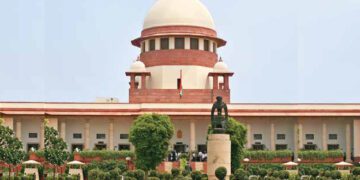 The issue of judicial activism and transgression beyond the constitutional provisions has been a matter of intense debate over the years. Articles 131 to 140 define the jurisdiction of the Supreme Court.
The issue of judicial activism and transgression beyond the constitutional provisions has been a matter of intense debate over the years. Articles 131 to 140 define the jurisdiction of the Supreme Court.
Going beyond these provisions and transgressions into the exclusive domains of other organs of state threatens to disturb the equilibrium, the very essence of the Indian Constitution.
The immediate trigger for such a debate is Supreme Court, being a constitutional body, questioning the manner of appointments in another constitutional body, the Election Commission of India.
As regards the appointments, the Election Commission is a constitutional body created and governed by Article 324 of the Constitution and it reads; “The Election Commission …….. and the appointment of the Chief Election Commissioner and other Election Commissioners shall, subject to the provisions of any law made in that behalf by Parliament, be made by the President.”

Similarly, the Supreme Court of India is also a constitutional body, created and governed by Article 124 of the Constitution of India.
It reads; “Every Judge of the Supreme Court shall be appointed by the President by warrant under his hand and seal [on the recommendation of the National Judicial Appointments Commission referred to in article 124A] and shall hold office until he attains the age of sixty-five years.”
SC CREATED COLLEGIUM
Without any express provision or law, the Supreme Court created its own collegium to nominate persons to become judges in Supreme Court or the High Courts.
The functioning of collegium has been questioned by some judges and it has generally been perceived as opaque and secretive. While there was general dissatisfaction about the manner and method of such appointments, the Parliament, well within its rights, enacted 99th constitutional amendment and set up National Judicial Appointments Commission (NJAC) to improve the process and build transparency in appointments.
As per its very design, these amendments reflect the will of the people of India that was brutally violated, as the Supreme Court struck down the 99th amendment by a 4:1 majority in October 2015, calling it violation of the basic structure of the constitution. In doing so, the Supreme Court drew legitimacy from its own directions given in Kesavananda Bharati case, that the Parliament cannot amend the basic structure or essential elements of the Constitution and this 99th amendment sought to change the basic structure.
Firstly, the directions limiting the Parliament’s mandate was in gross violation of the spirit of the Constitution and negation of the will of people represented by the Parliament and state Assemblies, who had passed and ratified the 99th Amendment. Secondly, what constitutes the basic structure or essential elements of the Constitution should be debated by the very people who gave unto themselves the Constitution and not by the apex court.
A DISCRIMINATORY PRACTICE
Now, this negation of people’s will and virtual abrogation of Article 368 cannot be perpetuated by striking down the 99th Amendment that sought to make the judicial appointments in higher judiciary, transparent and purely merit driven. And if the judicial appointments in the lower judiciary can be made by a certain selection process, why not the higher judiciary? Why such a discriminatory practice? Does the lower judiciary not matter? The vitiation of the Constitution, simply to defend their turf, perhaps in not in the best traditions of judiciary in India or anywhere else in the world.
Now the very court that violated the provisions of the Constitution, questions the manner of appointment of commissioners in another constitutional body, the Election Commission of India. I am not sure if the courts understand the complexity of the conduct of elections and the planning and execution it requires. Mobilising, training and deploying 90 lakhs personnel drawn from different and very diverse geographies, competencies and mindsets; all converging for a common and shared objective of conducting free and fair elections.
The apex court has habitually issued direction to the Election Commission about the manner and processes for conduct of elections, thus violating the exclusive mandate of the Election Commission. Would it not be prudent that the apex court checks this tendency to meddle into the domain of other constitutional bodies and the executive.
DEMONETISATION PIL
In yet another case, wherein the Supreme Court has entertained a PIL against notebandi (demonetisation of currency), I seriously wonder what expertise does the court have in adjudicating on very complex economic policy matters. Or how much do they understand the complexities of cross-border terrorism, when they come to deal with matters concerning Article 370 or the issues around genetically modified mustard crops.
The country needs to define the boundaries of judicial oversight and intervention in matters that lie in the exclusive preserve of the executive or legislature. The Supreme Court and the judiciary is mandated to deliver to the Indian citizenry affordable and speedy justice, purge deep-rooted corruption in our legal system and judiciary and build accountability at all levels. On each of these counts, our judiciary has not measured up. All the rhetoric and pontification aside, our courts must get down to administering justice to be able to bring relief to the ordinary poor litigant.
It has been 75 years and the litigants run from pillar to post and justice if at all, is either too little or too late. In spite of more courts, more staff, more resources, justice still eludes the common man. The wise judges, together with the Law Commission, may do well to streamline the processes and procedures and ensure that the judicial officers down the line are able to dispose of cases and are held accountable both for the quantity and the quality of such disposal.














 G20 podium
G20 podium

